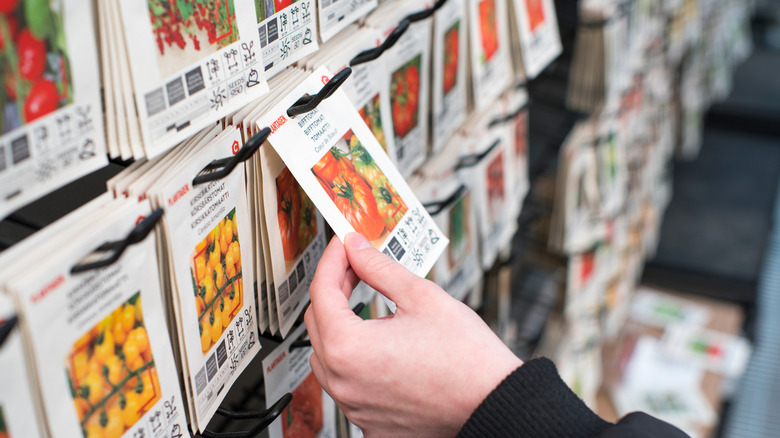The Medicine Cabinet Staple That Makes Storing Seeds Even Easier
The kitchen isn't the only place where leftovers linger. Many homeowners are left with a surplus of seeds at the end of the planting season. Maybe your raised bed garden wasn't large enough to accommodate the entire seed packet or you simply enjoy cultivating a wide variety of plants and use just a few seeds from an assortment of different envelopes. Regardless of the reason, throwing away unused seeds is not a good option, especially if you're a budget-conscious gardener. Instead of fumbling around trying to tape up paper seed packets, head to your medicine cabinet for an even easier solution — repurposing old prescription medication bottles.
If your bathroom is teeming with those translucent orange pill containers with white childproof lids, you aren't alone. According to the Health Policy Institute, nearly 70% of adults living in the United States take prescription drugs. Consequently, these highly-durable, airtight vials have become a medicine cabinet staple for millions of Americans. However, due to the bottles' small size, which causes them to fall through the holes of recycle screening devices during the sorting process, many municipal public works department programs ban them from curbside pickup. The good news is if you can't recycle the sturdy pill bottles, you can easily upcycle them. The moisture-free containers are the ideal storage place for unused seeds or seeds you collect from your garden.
How to use old prescription pill bottles for seed storage
The first step in repurposing old prescription pill bottles is to empty their contents and remove any exterior labels. Next, thoroughly wash the vials, making sure to scrub any residue that may have accumulated inside. When you're done, carefully dry the containers inside and out. Likewise, prior to filling the bottles, ensure the seeds are also dry as any level of moisture on them or in the container can lead to mold growth, which can negate the seeds' viability. Once the seeds are placed in the pill bottles, create new labels and attach them to the outside of the plastic vessels. Be sure to include name, variety, and the date printed on the seed packet or the date in which they were collected from your garden.
To preserve seeds, it's critical to keep the upcycled pill vials in a climate-controlled space. Resist the temptation to toss the containers on a shelf in an outdoor shed or garage where they will be exposed to light, heat, humidity, and pests. Rather, pick a cool, dark spot in your home where the temperature sits between 32 and 50 degrees Fahrenheit, such as a basement, closet, or cabinet that is protected from rodents. Doing so will keep most flower and vegetable seeds sustainable for at least one year, and possibly up to five years for varieties including tomatoes, beets, muskmelons, celery, lettuce, and cucumbers.
